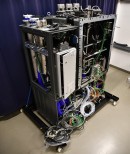A Norwegian clean-tech startup is ready to shake things up in the maritime industry with two major developments. One claims to be the world's safest and most compact fuel cell system, and the other is a Giga production facility for fuel cell stacks, also claiming to be the first of its kind in Europe.
FCM400 is the name of a brand-new fuel cell system that's ready to revolutionize maritime operations on the way to lower emission levels. It claims to be the most power-dense fuel cell system specifically designed for heavy-duty maritime applications. Its transformative potential stems from two major qualities – inherent safety and the lowest footprint on the market.
The FCM400 is based on a complex safety concept, which is supposed to ensure that any potential hazards would have as little consequences as possible. This concept includes certified components, rugged containment systems, a venting arrangement, and a separate safety system.
At the same time, the FCM400 claims to be the most compact system of its kind in the maritime industry. This is key when it comes to vessels because they have limited onboard space and special volume requirements. In terms of power output per unit volume, the FCM400 is believed to be unbeatable. It boasts remarkable energy density plus the ability to adapt to changes in power demand.
In terms of power, as its name suggests, the FCM400 starts at 400 kW and, thanks to its modular structure, can be scaled in power increments of 400 kW to fit various applications. It's primarily intended for ships' main or auxiliary engines, but it can be adapted for several other applications, including stationary shore power stations or construction sites.
This innovative fuel cell solution is the result of a collaboration between TECO 2030 and the Austria-based AVL. The FCM400 was recently displayed at AVL's headquarters in Graz, where the company celebrated its 75th anniversary.
The Oslo-based startup believes that hydrogen fuel cells are the answer for green maritime transportation in the future, and it tackled this challenge on multiple fronts. In addition to developing this groundbreaking fuel cell system together with its technology partner AVL, TECO 2030 is also gearing up to open a pioneering facility.
This future Giga production facility for hydrogen PEM fuel cell stacks will be located in Narvik, Norway, and it claims to be the first of its kind in Europe.
TECO is also working with Shell Shipping and Maritime on a project called Hy-Ekotank. This vessel will be retrofitted with TECO's fuel cell system in order to demonstrate the commercial benefits of hydrogen-based propulsion systems.
In the meantime, the FCM400 has already secured an AIP (Approval in Principle) from DNV and is on track for type certification.
The FCM400 is based on a complex safety concept, which is supposed to ensure that any potential hazards would have as little consequences as possible. This concept includes certified components, rugged containment systems, a venting arrangement, and a separate safety system.
At the same time, the FCM400 claims to be the most compact system of its kind in the maritime industry. This is key when it comes to vessels because they have limited onboard space and special volume requirements. In terms of power output per unit volume, the FCM400 is believed to be unbeatable. It boasts remarkable energy density plus the ability to adapt to changes in power demand.
In terms of power, as its name suggests, the FCM400 starts at 400 kW and, thanks to its modular structure, can be scaled in power increments of 400 kW to fit various applications. It's primarily intended for ships' main or auxiliary engines, but it can be adapted for several other applications, including stationary shore power stations or construction sites.
This innovative fuel cell solution is the result of a collaboration between TECO 2030 and the Austria-based AVL. The FCM400 was recently displayed at AVL's headquarters in Graz, where the company celebrated its 75th anniversary.
The Oslo-based startup believes that hydrogen fuel cells are the answer for green maritime transportation in the future, and it tackled this challenge on multiple fronts. In addition to developing this groundbreaking fuel cell system together with its technology partner AVL, TECO 2030 is also gearing up to open a pioneering facility.
This future Giga production facility for hydrogen PEM fuel cell stacks will be located in Narvik, Norway, and it claims to be the first of its kind in Europe.
TECO is also working with Shell Shipping and Maritime on a project called Hy-Ekotank. This vessel will be retrofitted with TECO's fuel cell system in order to demonstrate the commercial benefits of hydrogen-based propulsion systems.
In the meantime, the FCM400 has already secured an AIP (Approval in Principle) from DNV and is on track for type certification.








